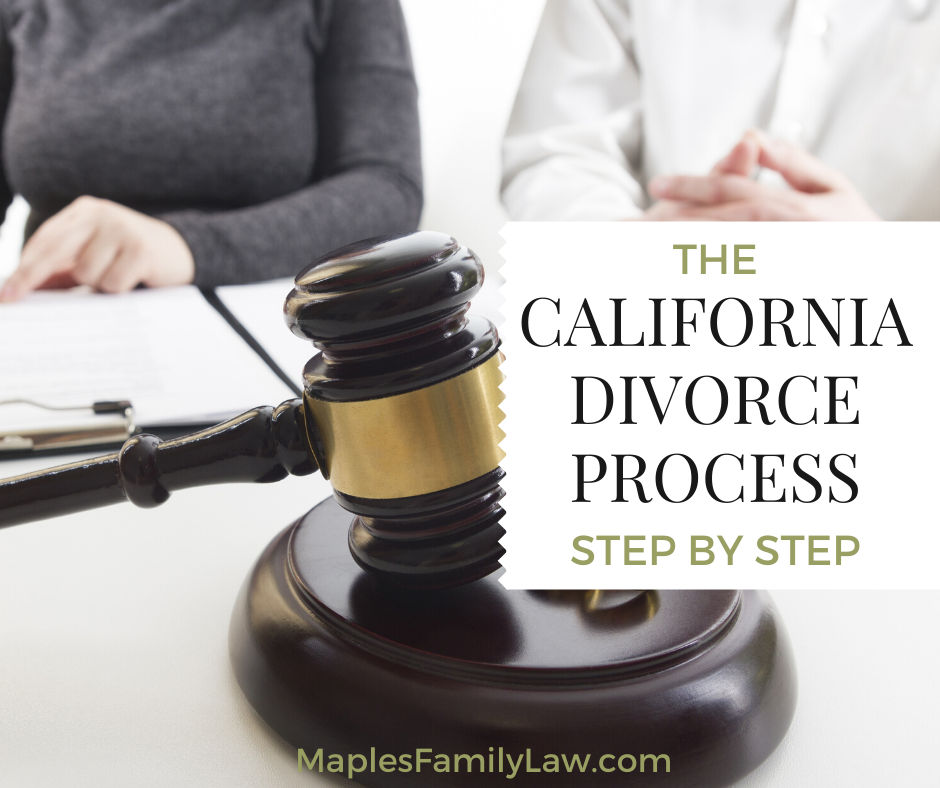
The California Divorce Process, Step by Step
The California divorce process, step by step, includes nine major components:
- Preparing paperwork to file
- Filing
- Serving divorce papers
- Responding to the divorce
- Temporary orders
- Financial disclosures
- Discovery
- Settlement
- Trial
The California Divorce Process, Step by Step
While no two divorces are exactly alike, most California divorces follow the same series of events. Every step requires you, your spouse or your attorney to take different actions, so here’s a closer look at each.
#1. Preparing paperwork to file
For most people, the best choice is to work with a Stockton divorce attorney who can provide legal advice every step of the way. Preparing paperwork to file for divorce can be complicated, and you’ll need to gather up several pieces of documentation. You need:
| Birth certificates | Pay stubs | Tax returns | Mortgage statements |
| Retirement account statements | Credit card bills and statements | Insurance policies and other documents | Other personal or financial documents, which your attorney can explain to you |
#2. Filing
When your attorney has completed the summons and petition for your divorce, she’ll file it with the court system. If you have children from your current relationship, she’ll also file a special form that outlines their residences over the past 5 years.
#3. Serving divorce papers
Serving divorce papers simply means that you’re notifying your spouse that you’ve filed for divorce. (If your spouse has already filed, there’s a good chance that you’ve been served with divorce papers.) Your attorney will handle this part for you.
Related: Serving divorce papers in California
#4. Responding to the divorce
Your spouse will have a chance to respond to the divorce paperwork you filed – or, if your spouse filed, you’ll have a chance to respond. If the person who receives the papers doesn’t respond within 30 days, the divorce can move forward without his or her input.
#5. Temporary orders
Sometimes temporary orders are necessary. They’re orders the judge in your case makes, which are good until the divorce is final; sometimes these orders become permanent. Judges often issue temporary orders for things like:
- Child custody
- Child support
- Spousal support
- Exclusive use of property (for your home or other property)
- Payment of attorney’s fees
Either party can ask the judge to create a temporary order during the divorce proceedings.
Related: Animal custody rights in California
#6. Financial disclosures
You and your spouse are required to disclose your financial situations to the court during the divorce process. Because California is a community property state, and because some property is considered separate property (meaning that it belongs to only one of you), the courts need an accurate picture of your situation. You’ll have to provide documentation to back up your claims, which can include:
- W-2s
- Check stubs
- Bank statements
- Federal and state income tax returns
- Titles and deeds
- Retirement account statements
- Credit card statements
- Insurance policies
You may need other documentation as well. Your attorney will explain what you need.
#7. Discovery
Discovery is the legal method of getting the information you need from your spouse during the California divorce process. Your attorney will file a formal legal request and may ask your spouse to answer written questions – and your spouse will have to admit or deny the truth of a statement under penalty of perjury. Your attorney may also want to depose your spouse, which means he or she will have to give oral testimony under penalty of perjury.
#8. Settlement
You and your spouse will reach a settlement (you can reach a settlement without Step 7 if you both agree that you’ve provided all the necessary documentation) at some point during your divorce process. The settlement is the result of a give-and-take negotiation where you and your spouse find common ground on things like property division and child custody. Your settlement agreement will also include information on:
- Child custody and visitation
- Child and spousal support
- Property division
- How you’ll handle your debts
- Your new marital status and, in some cases, a name change for one party
#9. Trial
Not all divorce cases end in a trial. In fact, you only have to go to trial if all your other settlement options have failed. Either you or your spouse can request a trial, but in some cases, the judge will set one even if neither of you asks.
The best way to keep your divorce out of court (other than to get a judge’s signature on your divorce paperwork) is to settle things with your spouse on your own. Trials can be time-consuming and expensive, and if you go to trial, your divorce will take much longer than it would if you settled.
Related: How long does it take to get a divorce in California?
Do You Need to Talk to an Attorney About the California Divorce Process, Step by Step?
We’ve helped many people in Stockton, and we can help you, too. Call us at (209) 546-6246 to set up a consultation to talk about your case and get answers to all your questions, including those about child custody and child support, property division and more.











